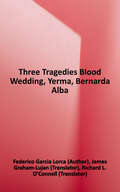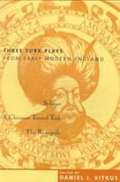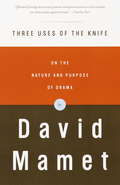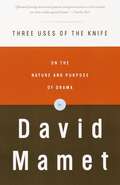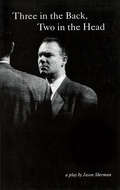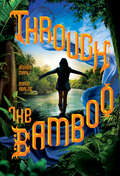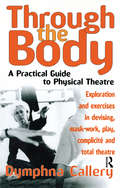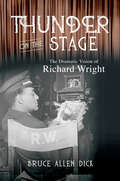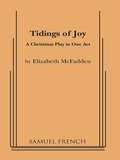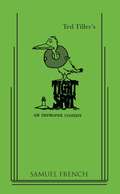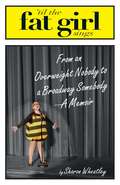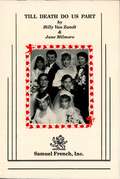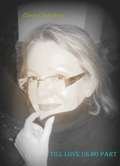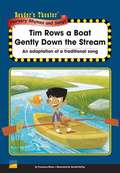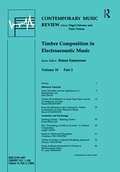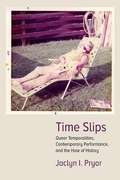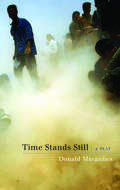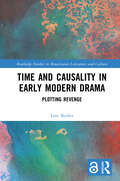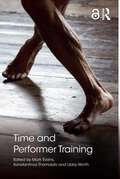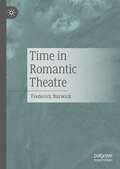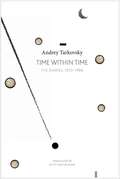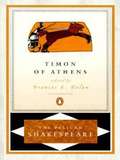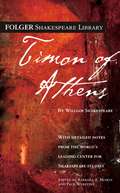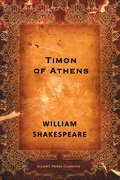- Table View
- List View
Three Tragedies: Blood Wedding, Yerma, Bernarda Alba
by Federico Garcia LorcaHere in the authorized translation by James Graham-Luján and Richard L. O’Connell, with an illuminating biographical introduction by the poet’s brother, Francisco García Lorca, are three tragic dramas by the great modern Spanish poet and playwright which have caught the imagination and won the critical acclaim of the literate world. <p><p>Blood Wedding. Concerned with love that cannot become marriage among the primitive hill people of Castile, this is a play of the workings of tremendous passions and tribal ritual toward an inescapable tragic end. Yerma. "The whole tragic burden of Yerma is measured by the deepening of her struggle with the problem of frustrated motherhood." -From García Lorca, by Edwin Honig. The House of Bernarda Alba. Again in "Women Who Love Moves to Tragedy," Bernarda Alba tells of the repression of five daughters by a domineering mother, of how their natural spirits circumvent her but bring violence and death.
Three Turk Plays from Early Modern England: Selimus, A Christian Turned Turk, and The Renegado
by Robert Greene Daniel J. Vitkus Robert Daborne Philip MassingerDuring the sixteenth and seventeenth centuries, the Ottoman empire posed a clear and present danger to Christian rule in Europe. While English commerce with the Mediterranean world expanded, Ottoman forces invaded Greece, Hungary, and Austria. At the same time, "Turkish" pirates and renegades from North Africa roamed the Atlantic and raided the coast of England. The threat was ideological as well: English sailors captured by Barbary pirates sometimes renounced their faith and converted to Islam. Here, three important early modern "Turk" plays―Robert Greene's Selimus, Emperor of the Turks (1594); Robert Daborne's A Christian Turned Turk (1612); and Philip Massinger's The Renegado (1623)―are available for the first time. These texts represent Islamic power and wealth in scenes of piracy on the high seas, on-stage execution by strangulation, and rites of religious conversion. The plays are set in historical and cultural context by Daniel J. Vitkus's clear and thoughtful introduction. These carefully edited, annotated, modern-spelling editions are particularly valuable for understanding the cultural production of English identity in relation to the Islamic Other.
Three Uses of the Knife
by David MametThe purpose of theater, like magic like religion...ids to inspire cleansing awe. With bracing directness and aphoristic authority, one of our greatest living playwrights addresses the questions: What makes good drama? And why does drama matter in an age that is awash in information and entertainment? David Mamet believes that the tendency to dramatize is essential to human nature, that we create drama out of everything from today's weather to next year's elections. But the highest expression of this drive remains the theater. With a cultural range that encompasses Shakespeare, Bretcht, and Ibsen, Death of a Salesman and Bad Day at Black Rock, Mamet shows us how to distinguish true drama from its false variants. He considers the impossibly difficult progression between one act and the next and the mysterious function of the soliloquy. The result, in Three Uses of the Knife, is an electrifying treatise on the playwright's art that is also a strikingly original work of moral and aesthetic philosophy.
Three Uses of the Knife: On the Nature and Purpose of Drama
by David MametMamet unravels the infamous "Second-Act Problem," considers the mysterious persistence of the soliloquy. Three Uses of the Knife is an inspired guide for any playwright that doubles as a trenchant work of aesthetic philosophy.
Three in the Back, Two in the Head
by Jason ShermanThe issue of loyalty and betrayal is dramatized through dialogue in the Governor-General's-Award-winning Three in the Back, Two in the Head, which appears to have been based on the assassination of Gerald Bull, the brilliant Canadian scientist who designed the first Star Wars system twenty years before Reagan announced his version. Bull ran afoul of the Pentagon and the CIA by his dealings with China, Chile, Yugoslavia, and Iraq. But Sherman's play is not a docudrama in any sense, for it merely uses some of the circumstances of the murdered scientist's career in order to concentrate on questions of personal and state morality as these circumscribe issues of loyalty and betrayal.
Through the Bamboo
by Andrea Mapili Byron AbalosTwelve-year-old Philly is literally pulled into an action-packed adventure while mourning the loss of her lola when she opens an old book and finds herself tossed into the fantastical land of Uwi. In Uwi, memories are stories, and all stories are forbidden since the datu’s storytelling-loving wife died and his youngest daughter Nale disappeared. Now his remaining daughters, the Sisters, rule with darkness in their hearts. So when Philly appears, the duwende believe that she is Nale and the key to saving Uwi. Can Philly save them all while searching for her lola to bring her back home? Similar to The Wizard of Oz, the Chronicles of Narnia, and Alice in Wonderland, this unique Filipinx-Canadian tale inspired by Philippine mythology shows the value of keeping memories alive and explores how families deal with loss.
Through the Body: A Practical Guide to Physical Theatre
by Dymphna CalleryIn Through the Body, Dymphna Callery introduces the reader to the principles behind the work of key practitioners of 20th-century theater including Artaud, Grotowski, Brook and Lecoq. She offers exercises that turn their theories into practice and explore their principles in action.
Thunder on the Stage: The Dramatic Vision of Richard Wright
by Bruce Allen DickRichard Wright’s dramatic imagination guided the creation of his masterpieces Native Son and Black Boy and helped shape Wright’s long-overlooked writing for theater and other performative mediums. Drawing on decades of research and interviews with Wright’s family and Wright scholars, Bruce Allen Dick uncovers the theatrical influence on Wright’s oeuvre--from his 1930s boxing journalism to his unpublished one-acts on returning Black GIs in WWII to his unproduced pageant honoring Vladimir Lenin. Wright maintained rewarding associations with playwrights, writers, and actors such as Langston Hughes, Theodore Ward, Paul Robeson, and Lillian Hellman, and took particular inspiration from French literary figures like Jean-Paul Sartre. Dick’s analysis also illuminates Wright’s direct involvement with theater and film, including the performative aspects of his travel writings; the Orson Welles-directed Native Son on Broadway; his acting debut in Native Son’s first film version; and his play “Daddy Goodness,” a satire of religious charlatans like Father Divine, in the 1930s. Bold and original, Thunder on the Stage offers a groundbreaking reinterpretation of a major American writer.
Tidings of Joy
by Elizabeth McfaddenShort Christmas drama \ 10 boys, 6 girls, extras \ Int. \ A young couple, faced with eviction from their home on Christmas Eve, is befriended by a group of boys and girls from the neighboring church. There is a plea for charity at the Christmas season and a reminder that any home that shelters a baby shares the august beauty of the Nativity story. A beautiful Christmas story that charmingly combines modern characters with the Bible.
Tight Spot
by Ted TillerAn Improper Comedy / 3m, 3f / Interior Set / Anyone nutty enough to buy an old lighthouse for a summer home is looking for trouble. It comes on the double to a novelist, her estranged TV film star husband and the latest gleam in his roving eye when this unsociable triangle, along with the novelist's globetrotting journalist mother, a baffled editor and a grocery boy find themselves trapped on the top floor during the off season. Suspense spirals and comedy crackles during three days of confinement.
Til The Fat Girl Sings: From an Overweight Nobody to a Broadway Somebody-A Memoir
by Sharon WheatleyA Simon & Schuster eBook. Simon & Schuster has a great book for every reader.
Till Death Do Us Part
by Jane Milmore Billy Van ZandtFarce / 6m, 5f / 2 Interiors / This delightful look at modern marriage in all its marred majesty had them rolling in the aisles at its premier in New Jersey. Narrated by a jaded bachelor who knows the bloom inevitably leaves the rose, the play opens with a pristine view of marriage: a wedding album slide show of the weddings of four happy couples. The images are quickly supplanted by the reality of the couples' eroding relationships. By the time all four couples repair to a Vermont country inn, their marriages are in an advanced state of disrepair. There doesn't seem to be a happy ending in sight, but the ending is full of surprises. The dialogue is sprinkled liberally with hilarious gags in this comedy about the dark side of marriage.
Till Love Us Do Part
by Elena Chernikova Kamilya SalibayevaElena Chernikova’s lyrical drama "Till Love Us Do Part" is acute in the way of thinking. In this play, love is the lifelong drama for all the characters.
Tim Rows a Boat Gently Down the Stream: An Adaptation of a Traditional Song
by Francisco BlaneNIMAC-sourced textbook
Timbre Composition in Electroacoustic Music (Contemporary Music Review #10.2)
by Simon EmmersonFirst Published in 1994. The contributions to this collection have been selected to define a range of interests from the technical, aesthetic, cognitive and compositional spheres. The book addresses the continuing need for musicologists, psychologists, composers and listeners to enter into a creative dialogue with designers and builders, who are usually programmers in the contemporary world. The collection as a whole will help to demonstrate the great potential for exchange between the multidisciplinary approaches to music.
Time Slips: Queer Temporalities, Contemporary Performance, and the Hole of History
by Jaclyn I. PryorPryor illuminates how each artist deploys performance as a tool to render history visible, trauma recognizable, and transformation possible by laying bare the histories and ongoing systems of violence woven deep into our society.
Time Stands Still
by Donald Margulies"The play's two hours fly by as if you've barely taken a breath. . . . Ethical dilemmas arise like exploding mines."-Variety"Mr. Margulies is a skilled practitioner of fluid dialogue that is naturally funny and sensibly smart." -The New York TimesIn his "absorbing intelligent" (Los Angeles Times) and timely new play, Donald Margulies uncovers the layers of a relationship between a photojournalist and foreign correspondent--once addicted to the adrenaline of documenting the atrocities of war, and now grounded in the couple's Brooklyn loft. Photographer Sarah was seriously injured while covering the war in Iraq; her reporter partner James had left weeks earlier, when the stress and horrors became too much for him. Now James writes online movie reviews while Sarah recovers, mourning for her Iraqi driver (and former lover) killed in the explosion, and itching to get back behind the camera. With this play--coming to Broadway this winter--Margulies revisits themes of being an artist, as characters ask: What does it mean to capture suffering on film, rather than stopping to intervene?Donald Margulies received the 2000 Pulitzer Prize for Drama for Dinner with Friends, which has been produced throughout the world. Other plays include Sight Unseen (OBIE Award), Brooklyn Boy, and Collected Stories, among many others.
Time and Causality in Early Modern Drama: Plotting Revenge (Routledge Studies in Renaissance Literature and Culture)
by Linc KeslerThe opening of the first commercial theatre in London in 1579 initiated a pattern of development that radically reshaped representation. The competition among theatres required the constant production of new works, creating an interplay between the innovations of producers and the rapidly changing perceptions of audiences. The result was a process of incremental change that redefined perceptions of time, action, and identity. Aristotle in the Poetics contrasted a similar set of formal developments to the earlier system of the epics, which, like many predecessors of early modern drama, had emerged from largely oral traditions. Located in the context of contemporary relations between the academy and Indigenous communities, Time and Causality in Early Modern Drama: Plotting Revenge traces these developments through changes in the revenge tragedy form and questions our abilities, habituated to literacy, to fully understand or appreciate the complexity and operations of oral systems.The Open Access version of this book, available at http://www.taylorfrancis.com, has been made available under a Creative Commons [Attribution-Non Commercial-No Derivatives (CC-BY-NC-ND)] 4.0 license.
Time and Performer Training
by Mark Evans Libby Worth Konstantinos ThomaidisTime and Performer Training addresses the importance and centrality of time and temporality to the practices, processes and conceptual thinking of performer training. Notions of time are embedded in almost every aspect of performer training, and so contributors to this book look at: age/aging and children in the training context how training impacts over a lifetime the duration of training and the impact of training regimes over time concepts of timing and the ‘right’ time how time is viewed from a range of international training perspectives collectives, ensembles and fashions in training, their decay or endurance. Through focusing on time and the temporal in performer training, this book offers innovative ways of integrating research into studio practices. It also steps out beyond the more traditional places of training to open up time in relation to contested training practices that take place online, in festival spaces and in folk or amateur practices. Ideal for both instructors and students, each section of this well-illustrated book follows a thematic structure and includes full-length chapters alongside shorter provocations. Featuring contributions from an international range of authors who draw on their backgrounds as artists, scholars and teachers, Time and Performer Training is a major step in our understanding of how time affects the preparation for performance.
Time in Romantic Theatre
by Frederick BurwickThe shift in temporal modalities of Romantic Theatre was the consequence of internal as well as external developments: internally, the playwright was liberated from the old imperative of “Unity of Time” and the expectation that the events of the play must not exceed the hours of a single day; externally, the new social and cultural conformance to the time-keeping schedules of labour and business that had become more urgent with the industrial revolution. In reviewing the theatre of the Romantic era, this monograph draws attention to the ways in which theatre reflected the pervasive impact of increased temporal urgency in social and cultural behaviour. The contribution this book makes to the study of drama in the early nineteenth century is a renewed emphasis on time as a prominent element in Romantic dramaturgy, and a reappraisal of the extensive experimentation on how time functioned.
Time within Time: The Diaries, 1970–1986
by Andrey Tarkovsky“Tarkovsky for me is the greatest,” wrote Ingmar Bergman. Andrey Tarkovsky only made seven films, but all are celebrated for its striking visual images, quietly patient dramatic structures, and visionary symbolism. Time within Time is both a diary and a notebook, maintained by Tarkovsky from 1970 until his death. Intense and intimate, it offers reflections on Dostoyevsky, Tolstoy, Hermann Hesse, Thomas Mann, and others. He writes movingly of his family, especially his father, Arseniy Tarkovsky, whose poems appear in his films. He records haunting dreams in detail and speaks of the state of society and the future of art, noting significant world events and purely personal dramas along with fascinating accounts of his own filmmaking. Rounding out this volume are Tarkovsky’s plans and notes for his stage version of Hamlet; a detailed proposal for a film adaptation of Dostoyevsky’s The Idiot; and a glimpse of the more public Tarkovsky answering questions put to him by interviewers.
Timon of Athens
by William Shakespeare Stephen Orgel A. R. Braunmuller Frances E. Dolan"I feel that I have spent half my career with one or another Pelican Shakespeare in my back pocket. Convenience, however, is the least important aspect of the new Pelican Shakespeare series. Here is an elegant and clear text for either the study or the rehearsal room, notes where you need them and the distinguished scholarship of the general editors, Stephen Orgel and A. R. Braunmuller who understand that these are plays for performance as well as great texts for contemplation." (Patrick Stewart) The distinguished Pelican Shakespeare series, which has sold more than four million copies, is now completely revised and repackaged. Each volume features: * Authoritative, reliable texts * High quality introductions and notes * New, more readable trade trim size * An essay on the theatrical world of Shakespeare and essays on Shakespeare's life and the selection of texts
Timon of Athens
by William Shakespeare Paul Werstine Barbara MowatThe real Timon of Athens lived there in the fifth century BCE, making him a contemporary of Socrates and Pericles. Shakespeare presents Timon as a figure who suffers such profound disillusionment that he becomes a misanthrope, or man-hater. This makes him a more interesting character than the caricature he had become to Shakespeare’s contemporaries, for whom “Timonist” was a slang term for an unsociable man. Shakespeare’s play includes the wealthy, magnificent, and extravagantly generous figure of Timon before his transformation. Timon expects that, having received as gifts all that he owned, his friends will be equally generous to him. Once his creditors clamor for repayment, Timon finds that his idealization of friendship is an illusion. He repudiates his friends, abandons Athens, and retreats to the woods. Yet his misanthropy arises from the destruction of an admirable illusion, from which his subsequent hatred can never be entirely disentangled. The authoritative edition of Timon of Athens from The Folger Shakespeare Library, the trusted and widely used Shakespeare series for students and general readers, includes: -Freshly edited text based on the best early printed version of the play -Full explanatory notes conveniently placed on pages facing the text of the play -Scene-by-scene plot summaries -A key to the play’s famous lines and phrases -An introduction to reading Shakespeare’s language -An essay by a leading Shakespeare scholar providing a modern perspective on the play -Fresh images from the Folger Shakespeare Library’s vast holdings of rare books -An annotated guide to further reading Essay by Coppélia Kahn The Folger Shakespeare Library in Washington, DC, is home to the world’s largest collection of Shakespeare’s printed works, and a magnet for Shakespeare scholars from around the globe. In addition to exhibitions open to the public throughout the year, the Folger offers a full calendar of performances and programs. For more information, visit Folger.edu.
Timon of Athens
by William ShakespeareWhen he loses his fortune, and he is forced to seek assistance from those he has helped in the past, Timon on Athens quickly learns who is friends are.`
